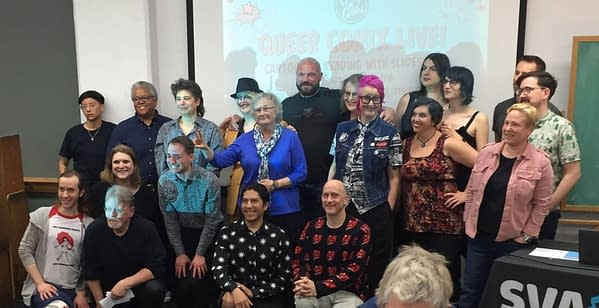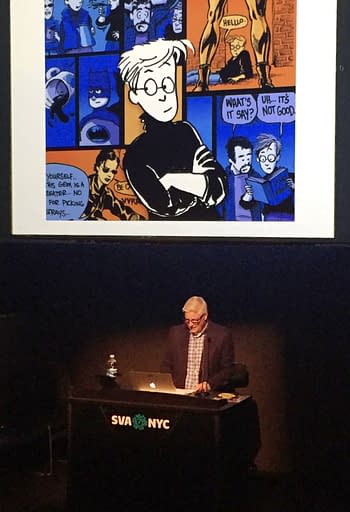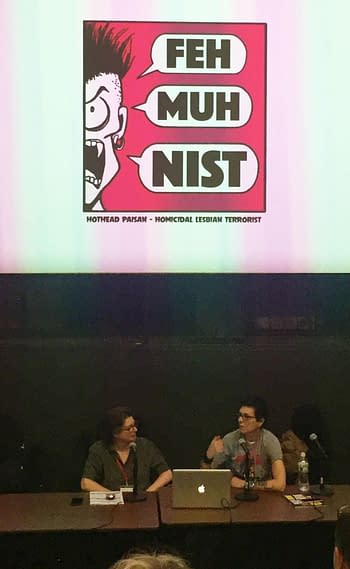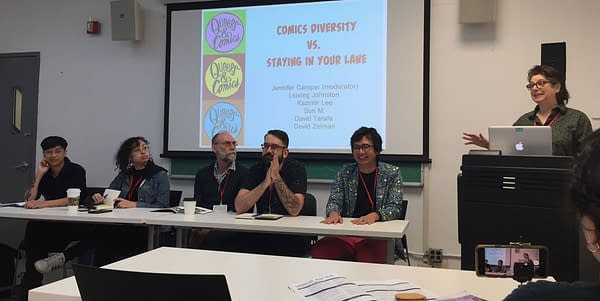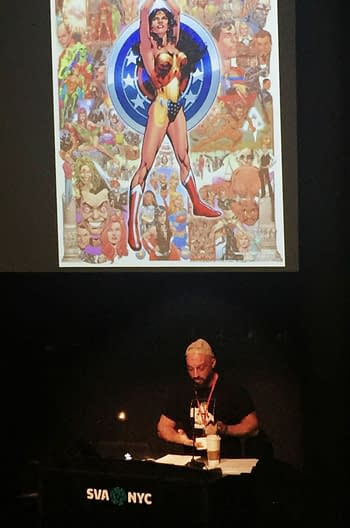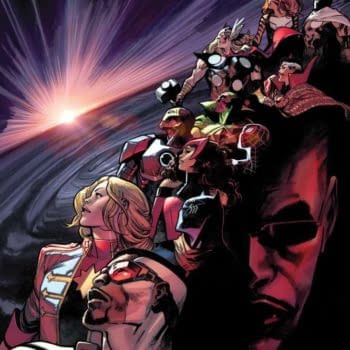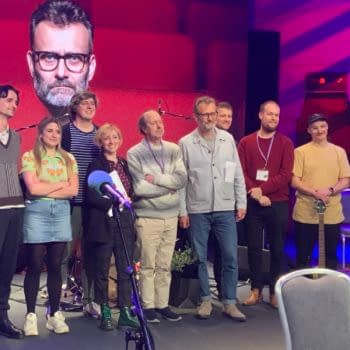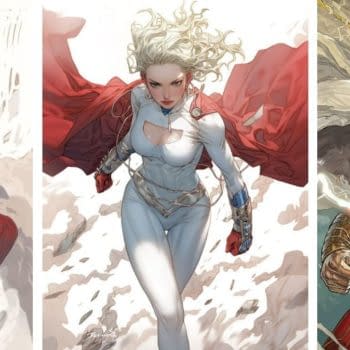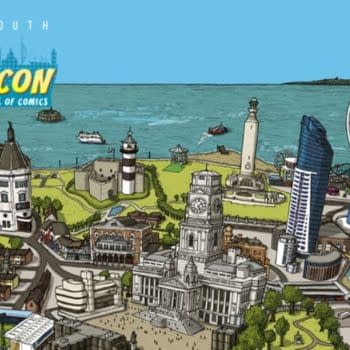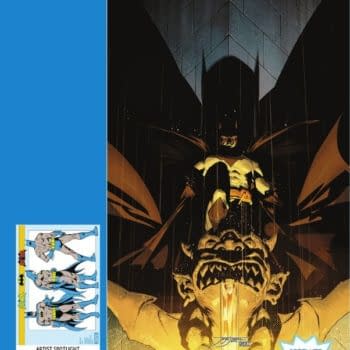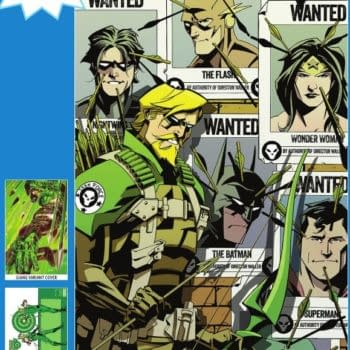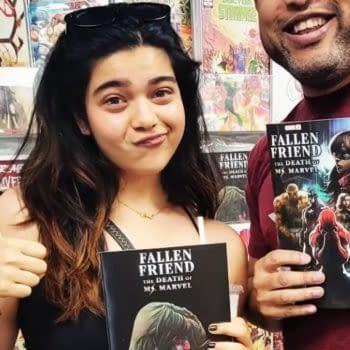Posted in: Comics | Tagged: Comics, entertainment
Queers & Comics in New York City
Jason A. Quest attended and exhibited at the third biannual "Queers & Comics" conference in New York City that ran on the weekend of May 16th–18th 2019. He writes about the event for Bleeding Cool.
The event returned to the Big Apple after taking place in San Francisco in 2017, this time hosted by the School for the Visual Arts in the Gramercy Park neighborhood of Manhattan. The conference – not to be confused with a convention, that's a different kind of "con" – is attended mainly by cartoonists, and features two full days of panels on topics of interest to trans, bi, gay, and lesbian artists and writers. It is put together by Jennifer Camper (Rude Girls and Dangerous Women) and Justin Hall (editor of No Straight Lines).
The event kicked off the night of May 16 with "Queer Comix Live", a fast-paced reading by almost 20 cartoonists accompanying slides of their work, emceed by Jeanne Thornton and Elizabeth Beier. Ranging from from light-hearted humor, to sentimental autobio, to powerful political statements, each cartoonist was given a strict three-minute time limit. The evening ended with a reception in the SVA library, which hosts a growing collection of cartooning art.
The first day of panels began at 9:30 on Friday, with typically four sessions taking place at any given time. [Lacking mutant powers, I was able to attend only one panel at a time, and will describe only those. –JAQ] These panels ranged in character, some more formal and academic with others more spontaneous. There were also shorter, less formal "conversation" sessions before or after meal breaks, and a keynote presentation at the end of each day. Saturday's schedule followed the same basic format.
"Pansexuality, Bisexuality, and Fluidity in Comics Storytelling" was moderated by Tara Madison Avery, and featured Ellen Forney, Rachael House, and Randall Kirby. One of the topics discussed was "bi invisiblity", the tendency for people to assume that bi people are either straight or gay/lesbian, depending on whom they happen to be in a relationship with, which can be especially difficult to depict in comics stories unless the character is actively involved with multiple people, which most bi people typically are not. Maggie from Love & Rockets was cited as an example.
"Redefining Queer Superheroes" was moderated by David Halperin. Phil Jimenez argued that superhero comics are inherently queer, comparing the characters to drag queens, and celebrating the flamboyant early gay hero Extraño. Magdalene Visaggio countered the accusation that there are "too many" queer superheroes being introduce by arguing that there are already too many straight superheroes: literally tens of thousands of them. Mariko Tamaki noted that sometimes only characters that are "under the radar" of publishers can take risks, such as Rachel Pollack with her explicitly trans superhero Coagula.
"A Colorful Past: The Evolution of Queer Comics Characters of Color" was so well attended, they had to "reclaim" additional chairs from the "European Perspectives" panel in the next room. It was moderated by scholar andré carrington, with analysis by Shanté Smalls. Anne Ishii outlined the history of gay manga publishing since the 1990s, from the Web and magazines, to phone apps and self-published dojinshi. Rupert Kinnard recounted his personal evolution, first making his own white superheroes, and later the Brown Bomber and Diva Touché Flambé, the first ongoing gay and lesbian African American comics characters. Ivan Velez described how he had begun creating Tales of the Closet for LGBT youth in the 1980s, helped diversify the Milestone comics line to include latino and LGBT characters, and has now returned to projects of his own such as Oso Oro and Wham Kablam.
Robert Kirby moderated "Long-Form Projects" featuring several graphic novelists with their thoughts about how to manage works that can take years to complete. Steve MacIsaac talked about studiously not redrawing work from early in the project. Eric Orner was relieved to be drawing a biography whose subject changed in appearance, making differences in the art less obvious. Hazel Newlevant added a prologue to her story that helped unify the earlier and later work. Nicole Georges described using a "progress" thermometer to keep herself motivated. Lee Marrs stayed up late and inked pages of her work at random while watching terrible old movies.
The schedule was filled out by more informal conversation sessions: on Friday between Justin Hall and Magdalaene Visaggio (Rachel Pollack was scheduled, but unable to be there), and between Nichole Georges and Mariko Tamaki; and a third on Saturday between Jennifer Camper and Diane DiMassa.
Friday's keynote presentation was by Paige Braddock, creator of the long-running syndicated lesbian-themed series Jane's World, and now Chief Creative Officer for Charles M. Schulz Creative Associates. She described her career since school as a cartoonist and a newspaper illustrator. When she was unable to get a newspaper syndicate interested in Jane's World, Terry Moore guided her into publishing it as a comic book, which opened up greater storytelling possibilities, and led to its eventual syndication. A turning point in her career was when she argued with a powerful syndicate editor while speaking on a panel. Schulz observed the exchange and offered her a job, trusting that she was someone who say "no" when needed. She worked with "Sparky" in his final years, and took on much of the responsibility for managing the Peanuts legacy after his stroke and subsequent death.
Saturday kicked off for me with "Comics Diversity vs. Staying in Your Lane", moderated by Jennifer Camper. The panel itself was itself a culturally diverse group of cartoonists: Liuxing Johnston, Kazimir Lee, Son M., David Tarafa, and David Zelman. The focus here was the conflict between trying to make one's comics more inclusive of other cultures and identities, without misrepresenting them or misappropriating them, and knowing when to let others tell their own stories, or how to do it responsibly.
"Bears, Butches, and Boys: Representing Masculinity" featured an array of viewpoints on masculinity, including gay male, trans male, and butch lesbian. It was moderated by Bill Zanowitz, with participants from New Zealand (Sam Orchard), Peru (Carlo Quispe), France (Cyril Denuet), Russia (Maximus Spragovsky), and the U.S. (Liuxing Johnston, who is Chinese American). There was a consensus among the panelists that, while masculinity is itself a fine thing, no one – including men – really benefits from its toxic forms.
I was a panelist on "The Oldest Profession: Graphic Storytelling and Sex Work", whose moderator Justin Hall described it as the first-ever forum on the subject. The panel also included Alex L. Combs, Tina Horn, Bryan Knight, and Sonya Saturday, each of whom spoke about the comics they've made relating to their own experiences with various kinds of sex work, such as exotic dancing, porn, and escorting. We spoke about the taboo and the professional risks of being associated with sex work, and the challenge of being honest about the reality of the work.
"Humor in Comics: Whose Limits?" featured Mike Diana, Diane DiMassa, Carlo Quispe, and Sonya Saturday, with moderator Sara Lautman. All are known for their transgressive humor, with Diana even being convicted for it by the state of Florida. There was a general agreement that they have not and will not draw cartoons depicting Donald Trump, on the grounds that he isn't funny.
I was also a panelist for "Drawing Queer Sex: Our Place in Erotic Comics" , which was moderated by Kori Michele Handwerker, and also featured KD Diamond, Blue Deliquanti, Kazimir Lee, Dave Davenport, and Jon Cairns. We talked about how to avoid objectifying or exploiting characters who are unlike ourselves, the kinds of things that comics can do with erotica that other media can't, and the obstacles that censorship places on publishing and distributing our work, both online and in print.
The Saturday keynote address was by Phil Jimenez, arguably the first openly gay artist in the mainstream superhero comics industry. He spoke about his upbringing by a single alcoholic mother, and falling in love with the characters of Wonder Woman and the Bionic Woman. He went to the School of Visual Arts, and with Karen Berger's help on his portfolio, Neal Pozner at DC hired him, based on his storytelling rather than his drawing skill. He spoke of his coming out in the text pages of the Tempest mini-series and the support he received at DC. He achieved his dream of working on Wonder Woman, the plum assignment of Infinite Crisis, and a number of other projects at DC and even in Hollywood, but has found them fraught with frustration and anxiety due to struggles with the company's changing direction. But he remains inspired by the principles he learned from his family, mentors, and their creations.
No definite plans have been set yet for the next Queers & Comics conference, though it is likely to be held in San Francisco again, in 2021.
Jason A. Quest is the writer and primary artist of JAQrabbit Tales, an ongoing serialized explicit graphic novel about a bisexual character based on himself. His first print collection stories from the series – "Mostly S.F.W." consisting of non-sexually-explicit episodes – debuted at the conference.


